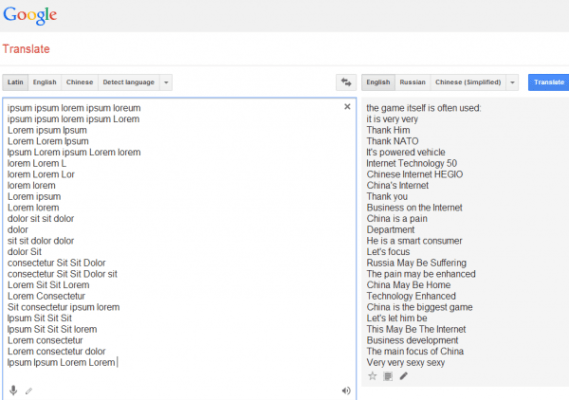If you’ve spent any time around designers or the Internet, you’ll at least have a passing familiarity with a chunk of text so pervasive online that it’s almost invisible. Called Greeking or Lorem Ipsum, the chunk of Latin is used by many designers as a placeholder for text on Internet pages. And, until recently, it could have been a secret language for spies.
First, a bit of background. The text used by designers once came on large pages of decals called Letraset. Designers would use it in place of actual text on spec designs. Internet designers adopted it as a standard place filler (in lieu of curses or “Text Goes Here” over and over) and it has become the white noise of the Internet, a sort of gray ooze that appears but is considered innocuous. Here’s a chunk:
Now here comes the weird part: today Brian Krebs wrote about a glitch in Google Translate that automatically turned Lorem Ipsum (in various permutations) into decidedly modern and nefarious-sounding English. Lorem ipsum became “China.” Ipsum lorem became “Internet” and “lorem lorem” translated to China’s Internet. There were a few more, but sadly for us conspiracy buffs Google has changed Translate to actually translate the text directly.
What could be going on here? Well, we know that Google Translate works by crowdsourcing translations from the Internet. For example, it doesn’t directly translate many tricky foreign phrases – it would lose the nuance. Instead it searches for previous translations of the same thing online and brings those up in real time. This assumes (correctly) that there are millions of pages out there written in multiple languages, a sort of mass Rosetta Stone that allows Google to avoid the heavy lifting of machine translation.
So perhaps millions of Chinese pages had English counterparts that contained only Lorem Ipsum. This means that many Chinese pages could contain “China’s Internet” paired with “lorem lorem” or the like.
But Krebs isn’t so sure. He and his security buddies worked feverishly to try to translate all of the permutations, to no avail. A few days after notifying Google, the translations were “fixed.”
“Fix.” Sure.
Check out Krebs’ piece and enjoy the thought that Internet protestors (or CIA) were using Lorem Ipsum as a way to pass coded messages in plain sight all over the Internet. Now if you’ll excuse me, I have to go back to JXHFKD JV QFK CLFI EXQ.
UPDATE – It appears that this change to Google Translate might have been requested by 1o57 for the Defcon badge puzzle, which is amazing in itself.
